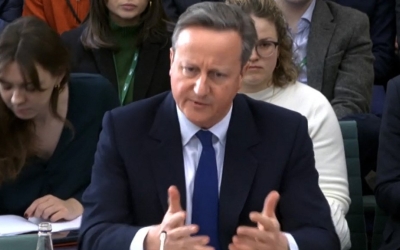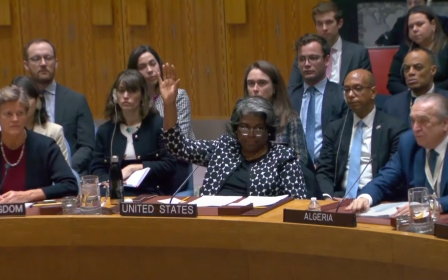War on Gaza: UK High Court dismisses legal challenge over arms sales to Israel

The UK High Court has dismissed a legal challenge that sought the immediate halt of British arms exports to Israel.
The case was brought by Palestinian human rights group Al Haq and the UK-based Global Legal Action Network (Glan) against the UK Department for Business and Trade. The organisations say they will appeal against Monday’s ruling.
The two groups filed the challenge in December, seeking a judicial review of the government’s export licensing process for the sale of British weapons to Israel.
More than 29,300 Palestinians have been killed in Gaza since Israel launched its assault on the enclave, following the Hamas attack on 7 October that killed 1,140 people, mostly Israelis.
The British government has licensed at least £472m worth of military exports to Israel since May 2015 with UK companies providing about 15 percent of the components of the F35 stealth combat aircraft which Israel has used to bomb Gaza, according to the Campaign Against Arms Trade.
New MEE newsletter: Jerusalem Dispatch
Sign up to get the latest insights and analysis on Israel-Palestine, alongside Turkey Unpacked and other MEE newsletters
Under its arms exporting criteria, the British government is obligated to suspend licences for arms exports if it determines that there is a clear risk that British weapons might be used in violations of international law.
The groups argued that there is substantial evidence that this moment has long passed.
The Department for Business and Trade has said it keeps arms export licences under "careful and continual review" and that it can respond quickly to changing international circumstances.
The High Court ruled to dismiss the case, saying that there was a "high hurdle" to establish that the department had been irrational in its decision-making, and there was "no realistic prospect" the hurdle would be surmounted in the challenge.
'Serious concerns' in Foreign Office
As a result of the challenge, the government revealed in court documents that Foreign Office officials had "serious concerns" as early as 10 November that Israel had breached international law in Gaza.
A Foreign Office unit responsible for assessing Israel's commitment and capability to comply with international law raised concerns in multiple reports up until 8 December, according to the court filing.

The unit, according to the account, was satisfied regarding some of its concerns after Israeli officials responded to a set of detailed questions from the Foreign Office.
Other concerns remained - including a lack of response from the Israelis about why food, water and medical supplies had been restricted into Gaza - but these were attributed to different interpretations of law.
According to the filing, Foreign Secretary David Cameron was advised that he had three options: he could keep arms sales to Israel under careful review; suspend where it was assessed items might be used to carry out Israeli military options in the conflict in Gaza; or suspend all licences.
He decided on 12 December that he was satisfied that Israel was committed to complying with international humanitarian law and advised Trade and Business Secretary Kemi Badenoch not to suspend licences. On 18 December, the government decided to continue arms sales.
The dismissal comes weeks after the International Court of Justice (ICJ) ordered Israel to take steps to prevent a genocide against Palestinians in Gaza.
Siobhán Allen, a lawyer with Glan, said: "The court’s decision that it is not arguable that the government got their risk assessment wrong to an unlawful degree is difficult to reconcile with the interim ruling of the ICJ.
"We will be asking for a hearing to review this decision and are confident that the court will see it differently and Al Haq’s claim can proceed.”
'The government's decision to continue supplying Israel … is effectively arming Israel to completely decimate the Gaza Strip'
- Shawan Jabarin, Al Haq
The ruling also comes a week after a Dutch court ordered a ban on sales of F-35 parts to Israel, citing a "clear risk" they could be used in violations of humanitarian law.
The foreign ministers of Italy and Spain said this month that their countries have halted arms exports to Israel since 7 October, although Spanish newspaper El Diario reported that Spanish ammunition has been sent to Israel since then.
Authorities say it was ordered before the Hamas attack and is for "test or demonstrations" and unlikely to be used in the conflict.
Shawan Jabarin, Al Haq's general director, said the British government's decision to continue supplying Israel with weapons "is effectively arming Israel to completely decimate the Gaza Strip, reducing Gaza's vital civilian infrastructure to rubble".
Middle East Eye has approached the Department for Business and Trade for comment.
Middle East Eye delivers independent and unrivalled coverage and analysis of the Middle East, North Africa and beyond. To learn more about republishing this content and the associated fees, please fill out this form. More about MEE can be found here.




